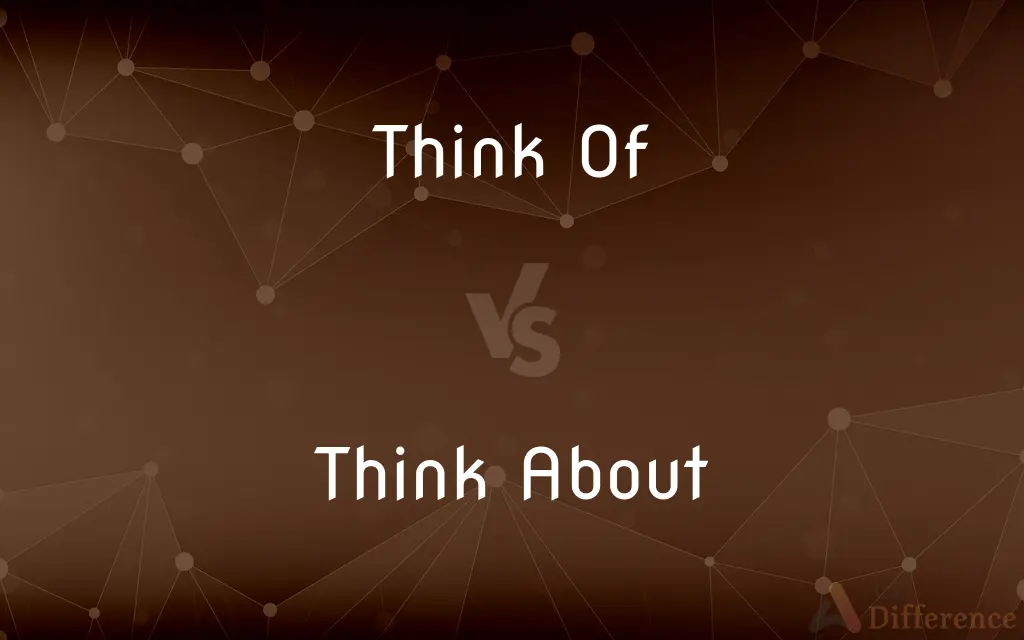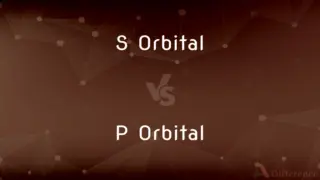Think Of vs. Think About — What's the Difference?
By Tayyaba Rehman — Published on November 24, 2023
Think Of" usually implies recalling or considering briefly, while "Think About" suggests contemplation or giving prolonged attention.

Difference Between Think Of and Think About
Table of Contents
ADVERTISEMENT
Key Differences
Think Of" and "Think About" are both expressions in the English language, but they carry different nuances in many contexts. When someone says "Think Of," it often refers to a quick mental reference or a sudden idea. On the other hand, "Think About" implies a more extended, deliberative process of musing or pondering.
In some scenarios, "Think Of" is used to express the act of recalling something from memory, perhaps spontaneously. "Did you think of the answer?" contrasts with "Think About," which might be used when asking someone to consider or reflect on a particular topic or situation: "Did you think about the consequences?"
"Think Of" can also hint at an association or a relationship, like "What do you think of when you see this symbol?" In contrast, "Think About" would be more about the process of considering a subject in depth, as in "I need to think about my plans for the weekend."
The distinction between "Think Of" and "Think About" might seem subtle, but understanding it can greatly affect the meaning conveyed. For instance, "I often think of you" might be used when someone crosses your mind occasionally, while "I often think about you" suggests deeper and more frequent contemplation.
Lastly, while there's overlap in the usage of "Think Of" and "Think About," their context usually provides clarity. "Think Of" often nudges towards immediate reaction or association, while "Think About" leans into the realm of reflection and deliberation.
ADVERTISEMENT
Comparison Chart
Duration
Brief, sudden
Prolonged, extended
Implication
Recall, association
Contemplation, reflection
Common Usage
Referring to first thoughts or memories
Referring to in-depth consideration
Depth of Thought
Often surface-level or spontaneous
Deeper, more involved
Relationship to Subject
Immediate reaction or association
Ongoing pondering or consideration
Compare with Definitions
Think Of
To associate with.
I think of joy when I see children playing.
Think About
To contemplate or reflect on a subject.
I often think about our childhood memories.
Think Of
To have an opinion about something.
What do you think of this movie?
Think About
To weigh or evaluate.
You should think about the pros and cons before deciding.
Think Of
To consider a possibility.
Did you think of asking her for help?
Think About
To consider or ponder something.
Did you think about the proposal I sent you?
Think Of
To create or invent.
She's always thinking of new ideas for her business.
Think About
To plan or intend.
I'm thinking about going on a vacation next month.
Think Of
To recall something from memory.
When I think of summer, I remember our beach trips.
Think About
To have something on one's mind.
I can't stop thinking about the news.
Common Curiosities
How does "Think Of" relate to memory?
"Think Of" often pertains to recalling something from memory or having a quick association.
Can "Think Of" and "Think About" be used interchangeably?
While they sometimes overlap, context matters, and they can convey different nuances.
When pondering consequences, which phrase should I use?
"Think About" is suitable, as in "Did you think about the consequences?"
What does "Think Of" typically imply?
"Think Of" usually implies recalling or having a brief thought about something or someone.
Is "Think About" more about deeper contemplation?
Yes, "Think About" often suggests giving more extended attention or consideration.
Is "Think Of" more spontaneous?
Often, "Think Of" can hint at a more spontaneous or immediate thought.
If I'm reflecting on a life decision, which phrase fits better?
"Think About" would be more appropriate for reflecting on a significant life decision.
Can "Think About" imply planning?
Yes, like in "I'm thinking about visiting Europe," it implies considering or planning.
Which phrase suits when I'm frequently contemplating a subject?
"Think About" is fitting, as in "I frequently think about climate change."
How does "Think Of" convey opinion?
In contexts like "What do you think of this?", it asks for an opinion or impression.
Which phrase indicates a more fleeting thought?
"Think Of" often indicates a more brief or fleeting thought.
Is "Think Of" more about first reactions?
Yes, "Think Of" often pertains to immediate reactions or associations.
Can "Think Of" indicate invention or creativity?
Yes, like "She always thinks of new solutions," it implies coming up with ideas.
Is "Think About" used for evaluation?
Yes, it can indicate weighing options or evaluating, as in "Think about your choices."
How does "Think About" convey depth?
"Think About" implies a more in-depth, thorough contemplation or musing.
Share Your Discovery

Previous Comparison
S Orbital vs. P Orbital
Next Comparison
Distilled Water vs. Boiled WaterAuthor Spotlight
Written by
Tayyaba RehmanTayyaba Rehman is a distinguished writer, currently serving as a primary contributor to askdifference.com. As a researcher in semantics and etymology, Tayyaba's passion for the complexity of languages and their distinctions has found a perfect home on the platform. Tayyaba delves into the intricacies of language, distinguishing between commonly confused words and phrases, thereby providing clarity for readers worldwide.











































